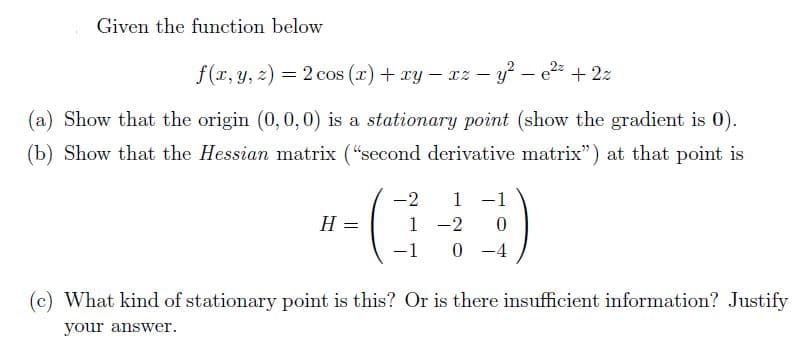Given the function below f(x, y, z) = 2 cos (r) + xy - xz - y² - e²% +2% (a) Show that the origin (0, 0, 0) is a stationary point (show the gradient is 0).
Given the function below f(x, y, z) = 2 cos (r) + xy - xz - y² - e²% +2% (a) Show that the origin (0, 0, 0) is a stationary point (show the gradient is 0).
Linear Algebra: A Modern Introduction
4th Edition
ISBN:9781285463247
Author:David Poole
Publisher:David Poole
Chapter4: Eigenvalues And Eigenvectors
Section4.6: Applications And The Perron-frobenius Theorem
Problem 70EQ
Related questions
Question

Transcribed Image Text:Given the function below
f(r, y, z) = 2 cos (r) + xy - xz – y – e2 + 2z
%3D
|
(a) Show that the origin (0,0,0) is a stationary point (show the gradient is 0).
(b) Show that the Hessian matrix ("second derivative matrix") at that point is
-2
1 -1
H =
1
-2
-1
0 -4
(c) What kind of stationary point is this? Or is there insufficient information? Justify
your answer.
Expert Solution
This question has been solved!
Explore an expertly crafted, step-by-step solution for a thorough understanding of key concepts.
Step by step
Solved in 2 steps

Recommended textbooks for you

Linear Algebra: A Modern Introduction
Algebra
ISBN:
9781285463247
Author:
David Poole
Publisher:
Cengage Learning

Algebra & Trigonometry with Analytic Geometry
Algebra
ISBN:
9781133382119
Author:
Swokowski
Publisher:
Cengage

Elementary Linear Algebra (MindTap Course List)
Algebra
ISBN:
9781305658004
Author:
Ron Larson
Publisher:
Cengage Learning

Linear Algebra: A Modern Introduction
Algebra
ISBN:
9781285463247
Author:
David Poole
Publisher:
Cengage Learning

Algebra & Trigonometry with Analytic Geometry
Algebra
ISBN:
9781133382119
Author:
Swokowski
Publisher:
Cengage

Elementary Linear Algebra (MindTap Course List)
Algebra
ISBN:
9781305658004
Author:
Ron Larson
Publisher:
Cengage Learning